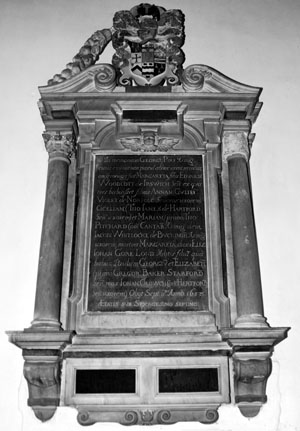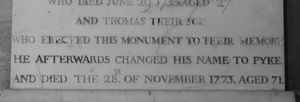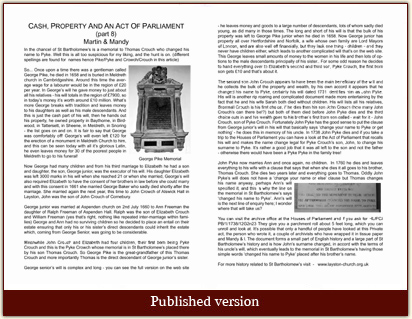Martin & Mandy

In the chancel of St Bartholomew’s is a memorial to Thomas Crouch who changed his name to Pyke. Well this is all too suspicious for my liking, and the hunt is on. (different spellings are found for names hence Pike/Pyke and Crowch/Crouch in this article)
So... Once upon a time there was a gentleman called George Pike, he died in 1658 and is buried in Meldreth church in Cambridgeshire. Around this time the average wage for a labourer would be in the region of £20 per year. In George’s will he gave money to just about all his relatives - his will totals in the region of £7900, so in today’s money it’s worth around £10 million. What’s more George breaks with tradition and leaves money to his daughters as well as his male descendants. And this is just the cash part of his will, then he hands out his property, he owned property in Baythorne, in Birdwood, in Tattersett, in Sheene, in Meldreth, in Snoring - the list goes on and on. It is fair to say that George was comfortably off! George’s will even left £120 for the erection of a monument in Meldreth Church to him, and this can be seen today with all it’s glorious Latin, he even leaves money for 30 of the poorest people in Meldreth to go to his funeral!
 Now George had many children and from his third marriage to Elizabeth he had a son and daughter, the son, George junior, was the executor of his will. His daughter Elizabeth was left 3000 marks in his will when she reached 21 or when she married, George’s will also required Elizabeth to have the consent of her brothers in law before she could marry and with this consent in 1661 she married George Baker who sadly died shortly after the marriage. She married again the next year, this time to John Crowch of Alswick Hall in Layston, John was the son of John Crouch of Cornebury.
Now George had many children and from his third marriage to Elizabeth he had a son and daughter, the son, George junior, was the executor of his will. His daughter Elizabeth was left 3000 marks in his will when she reached 21 or when she married, George’s will also required Elizabeth to have the consent of her brothers in law before she could marry and with this consent in 1661 she married George Baker who sadly died shortly after the marriage. She married again the next year, this time to John Crowch of Alswick Hall in Layston, John was the son of John Crouch of Cornebury.
George junior was married at Aspenden church on 2nd July 1660 to Ann Freeman the daughter of Ralph Freeman of Aspenden Hall. Ralph was the son of Elizabeth Crouch and William Freeman (yes that’s right, nothing like repeated inter-marriage within families) George and Ann had no surviving children so he decided to place an entail on their estate ensuring that only his or his sister’s direct descendants could inherit the estate which, coming from George Senior, was going to be considerable.
Meanwhile John Crouch and Elizabeth had four children, their first born being Pyke Crouch and this is the Pyke Crowch whose memorial is in St Bartholomew’s placed there by his son Thomas Crouch. So George Pike is the great-grandfather of this Thomas Crouch and more importantly Thomas is the direct descendant of George junior’s sister.
George senior’s will is complex and long - you can see the full version on the web site - he leaves money and goods to a large number of descendants, lots of whom sadly died young, as did many in those times. The long and short of his will is that the bulk of his property was left to George Pike junior when he died in 1658. Now George junior has property all over Hertfordshire and Norfolk, a wife whose own family are Lord Mayors of London, and are also well off financially, but they lack one thing - children - and they never have children either, which leads to another complicated will that’s on the web site. This George leaves small amounts of money to the women in his life and then lots of options to the male descendants principally of his sister.. For some odd reason he decides to hand everything over to Elizabeth’s second and third son, Pyke Crouch, the first born son gets £10 and that’s about it.
The second son John Crouch appears to have been the main beneficiary of the will and he collects the bulk of the property and wealth, by his own accord it appears that he changed his name to Pyke, certainly his will dated 1731 identifies him as John Pyke. His will is another rip roaring and complicated document made more entertaining by the fact that he and his wife Sarah both died without children. His will lists all his relatives, Bromsall Crouch is his first choice, if he dies then his son John Crouch (how many John Crouch’s can there be!?) but both of them died before John Pyke dies and the third choice cuts in and his wealth goes to his brother’s first born son called - wait for it - John Crouch, son of Pyke Crouch. Fortunately John Pyke has the good sense to put the clause from George junior’s will in his will that basically says ‘change your name to Pyke or get nothing’ - he does this in memory of his uncle. In 1738 John Pyke dies and if you take a trip to the Houses of Parliament you can have a look at the Act of Parliament that recalls his will and makes the name change legal for Pyke Crouch’s son, John, to change his surname to Pyke. It’s rather a good job that it was all left to the son and not the father - otherwise there would have been a Pyke Pyke in the family tree!
 John Pyke now marries Ann and once again, no children. In 1760 he dies and leaves everything to his wife with a clause that says that when she dies it all goes to his brother, Thomas Crouch. She dies two years later and everything goes to Thomas. Oddly John Pyke’s will does not have a ‘change your name or else’ clause but Thomas changes his name anyway, perhaps Ann’s will specified it, and this is why the line on the memorial in St Bartholomew’s says ‘changed his name to Pyke’. Ann’s will is the next line of enquiry here; I wonder where that will take us?
John Pyke now marries Ann and once again, no children. In 1760 he dies and leaves everything to his wife with a clause that says that when she dies it all goes to his brother, Thomas Crouch. She dies two years later and everything goes to Thomas. Oddly John Pyke’s will does not have a ‘change your name or else’ clause but Thomas changes his name anyway, perhaps Ann’s will specified it, and this is why the line on the memorial in St Bartholomew’s says ‘changed his name to Pyke’. Ann’s will is the next line of enquiry here; I wonder where that will take us?
You can visit the archive office at the Houses of Parliament and if you ask for HL/PO/PB/1/1738/12G2n23 They give you a parchment roll about 5 feet long, which you can unroll and look at. It’s possible that only a handful of people have looked at this Private act, the person who wrote it, a couple of archivists who have wrapped it in tissue paper and Mandy & I. The document forms a small part of English history and a large part of St Bartholomew’s history and is how John’s surname changed, in accord with the terms of his uncle’s will, which eventually leads to the memorial in St Bartholomew’s having those simple words ‘changed his name to Pyke’ placed after his brother’s name.
 |
|
 |
